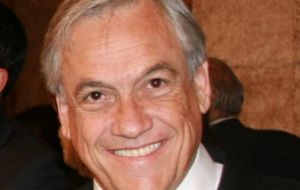MercoPress. South Atlantic News Agency
“Efficiency”, the watchword for Chile’s Berlusconi, according to FT
 Sebastián Piñera leads in public opinion polls after 19 years of the ruling coalition Concertacion
Sebastián Piñera leads in public opinion polls after 19 years of the ruling coalition Concertacion Chilean Conservative presidential candidate, billionaire Sebastián Piñera is described as Chile’s Berlusconi in an article from the Financial Times (FT), which also underlines his lead in public opinion polls and the growing problems faced by the ruling coalition after 19 years in office.
As head of Chile's right-wing coalition, Mr Piñera is enjoying a comfortable lead in the run-up to national elections in December. After 19 years of the left-wing Concertación alliance, Chileans are showing an appetite for change, but not too much, which is just what Mr Piñera is offering, according to FT..
“Our objective is to maintain the network of social protection that has been constructed by the last governments . . . but to make it more efficient”. For this successful entrepreneur “efficiency” has become the watchword and there will be no messing with the policies that investors have come to love about Chile: balanced budgets, open markets, stable institutions and respect for the rule of law.
Known to his critics as “Chile's Silvio Berlusconi”, Mr Piñera's pitch rests on bringing business-like proficiency to that package. “Efficiency isn't a word that only interests the world of private companies. Efficiency is a word that does - or ought to - interest the world of politics,” he argues.
His message is “better, quicker” delivery across the public sector. He pledges to root out inefficiencies and slash bureaucracy in healthcare, public education and crime prevention.
As for the role of the state in general, he concedes a place for government in bringing about “profound modernizations”, but decries any excessive dallying in the private sector. “We want a state that strengthens its muscles but doesn't accumulate fat,” he says, giving a nod to those on both the left and right of Chile's political spectrum.
But, says FT, Piñera's effort to present himself as a moderate voice and transitional president has still to convince some voters.
For starters, questions have been raised about his business activities. His personal fortune derives from introducing credit cards into Chile in the late 1970s. Since then, his portfolio of assets has expanded to include the terrestrial television channel Chilevisión and a stake of about 27% in former state airline LAN. “He's never really separated his politician side from his business side,” says Patricio Navia, a Latin American specialist at New York University.
Although Mr Piñera recently placed his investments under the control of a blind trust, he continues to run his political campaign from the headquarters of his business operations. That makes people wary, says Mr Navia.
The nickname of “Chile's Berlusconi” drew strength when it emerged that Mr Piñera had undergone plastic surgery on his eyelids. He rejects the comparison with Italy's prime minister as neither “just nor adequate”. As for the surgery, that was to help correct his peripheral vision, he said.
Questions also surround Piñera's views on the Pinochet dictatorship, in which his brother was a cabinet minister. A former senator and self-proclaimed Christian Humanist, Piñera insists he voted against the continuation of the Pinochet regime in a 1988 referendum. Yet a year later he backed the presidential campaign of Pinochet's finance minister.
“With Piñera come a more modernized, more democratic right . . . but also part of the political right that is linked to the dictatorship,” argues José Jara, director of the political research centre Flacso Chile.
But fortunately for Piñera, the ruling Concertación alliance is in disarray. Despite record personal approval ratings of more 70% for President Michele Bachelet, Chile's ruling coalition has lost steam after almost two decades in power.
Concertación's candidate, Eduardo Frei, holds second place in the opinion polls. Yet most surveys put him 10 points behind Piñera, who enjoys ratings of about 37%.
This is the conservative candidate second attempt at the Chilean presidency. In 2005, he lost to Ms Bachelet in a run-off. Despite the ruling party's problems, Chile's presidential hopeful has so far held off from negative campaigning. “The government has good intentions, but it hasn't been successful in achieving these,” he says.




Top Comments
Disclaimer & comment rulesCommenting for this story is now closed.
If you have a Facebook account, become a fan and comment on our Facebook Page!